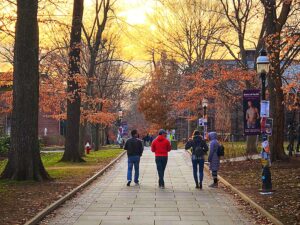Columbia University, ranked 2nd overall in last year’s ranking of top colleges by US News, has just suffered a serious setback, and has been relegated to #18 on the much vaunted rankings list. The New York Times broke the story first, revealing how Columbia allegedly shared outdated or misleading data with US News, and then received a rank it did not deserve.
This incident has raised many questions, about Columbia as an institution, and about the integrity of college rankings as a whole. In this article, we’ll explore what happened, what this means for the broader admissions picture, and what this means for the idea of college rankings as a whole. We’ll also discuss the overall relevance of college rankings to your application process.
What did Columbia do Exactly?
In February, Columbia math professor Michael Thaddeus released a report he wrote detailing an investigation into Columbia’s rise in the US News rankings, and accusing the school of malpractice while doing so. In his report, he investigates the numerical claims Columbia makes to US News, which it uses to calculate the rank of schools, and presents evidence that Columbia’s claims are incorrect and misleading. The actual pieces of information covered are:
- Class sizes. While Columbia reported that 82.5% of its classes had 20 or fewer students, based on analysis of the school’s directory, the author concluded only between 62.7% and 66.9% of classes actually contained 20 or fewer students.
- Faculty with terminal degrees. Columbia claims 100% of faculty have a terminal degree, while the author’s research showed the number was actually 96%.
- Full-time faculty. Columbia claims that 96.5% of its faculty are full-time. Based on data provided to the federal government, however, the author concludes that only 74.1% of its faculty are full-time.
- Student to faculty ratio. Columbia claims a student to faculty ratio of 6:1. Due to questionable reporting of part-time faculty, the author concludes the ratio may be closer to 11:1, though is unable to say for certain.
The author also covers data manipulation practices he considers misleading. These cover how Columbia reports spending per student, and manipulation of the retention and graduation rate through the discounting of transfer students. While these are not outright lies, the author considers them to be manipulations of how the data should be presented.
Columbia responded that they would perform a review of their data policies in response to these allegations, and would not submit data for this year’s rankings. US News responded by moving Columbia to be unranked, and then dropping their rank to 18th in September.
So What does this Mean for College Admissions?
In terms of the actual value of a Columbia education, very little. We will discuss the value of college rankings, and new criticisms of them which have arisen from this incident below. For college admissions, however, rankings matter because we all believe they do, and that belief has a power all its own.
Thus Columbia’s fall from grace may impact college admissions by reducing the number of students, or parents, who want to apply to a school mired in such a controversy. Or those who base their admissions decisions on prestige, and are leery of a school which has suffered such a precipitous drop in standings.
While it remains to be seen if this actually occurs, what we predict is that Columbia’s acceptance rate will climb slightly this year compared to last. This does not mean it will suddenly be easy to get into Columbia, merely that it will be easier than it otherwise will be. Based on trends of top colleges generally, we expect the acceptance rate to still be at or under 10% overall.
This is because, regardless of where it falls on the ranking, Columbia remains a very good Ivy League school, and has a high degree of name recognition. Thus it will still receive a similar number of applicants, if slightly fewer than it otherwise would.
What this Means for College Rankings
Columbia’s professor Thaddeus, who first brought this situation to light, spends much of the conclusion of his report attacking the idea of college rankings in general. This is nothing new, indeed, many people have previously raised questions about the validity of college rankings, and whether they should matter to you for your college applications.
We believe he raises some interesting points, however, and would like to take some time to address them, and what they might mean for the future of college rankings as an institution.
One of the points he raises, and the one we believe is most relevant, is the fact that the majority of the data used by US News is given to it by the universities themselves. US News prides itself on the rigor they put into rankings, and point to their data as proof that their rankings have merit. The source of this data, however, bears a closer examination.
80% of the data used by US News is given to it by the same universities they are ranking. These universities have every incentive to make themselves look better, after all, the higher a university is ranked, the more students, funding, and prestige they attract. While universities are quick to claim that they are only interested in providing the best education possible, they cannot resist the allure of prestige provided by the rankings.
This undermines the entire premise of the rankings. Columbia has been caught massaging the data to their interest, but as professor Thaddeus expresses, they are likely far from the only ones to be doing so. A comprehensive review of other universities, as the author took for Columbia, would no doubt raise further questions as to the veracity of the rankings.
The other point the author makes which we believe is particularly relevant is that college rankings are, inherently, flawed; in both conception and execution. The conceit of college rankings is that it is possible to objectively rank institutions of higher education relative to each other. This is not the case, based on our experience; the differences are far too fluid.
It is natural for humans to want to judge things against each other, to try to determine which thing is objectively the best, relative to the others. This extends even to categories where such rankings are meaningless. Colleges are one such category.
This is not to say that all colleges are equal. There are definitely different tiers of colleges, but even this is somewhat subjective. There is likely no objective way to measure the quality of instruction and the educational benefits of one college against another. Thus we believe that, overall, college rankings are generally meaningless, though this has not yet impacted their popularity.
What do Rankings Mean for You?
The truth of college rankings is that they matter because people believe they matter. This belief can impact your future prospects, especially in certain fields. In investment banking, for instance, the prestige of your undergraduate institution is one of the key factors taken into account when making hiring decisions.
Thus rankings should matter to you if prestige matters. The top ranked colleges offer an advanced ability to network, and to make connections which can aid you later in your life. While you can network and make connections at any college, not all colleges are equal in this regard.
Overall, we recommend a school’s ranking should not be a deciding factor when creating a college list, or deciding which school to attend. Fit is far more important for determining both how well you will perform at a school, and how well it will set you up for success.
If you want advice on finding what college is the best for you, check out our articles on building a college list, and on what college is right for you. Doing your research is the best way to make sure a college has everything you will need, and will set you up for the future you want.
Final Thoughts
What Columbia did was clearly wrong, but we doubt it is the only college to be manipulating the rankings in this way. After all, every incentive and opportunity is given to colleges to massage the data in their favor, and to do everything they can to boost their spot in the rankings.
We are interested to see if other academics do similar research about their own colleges, and whether this is a larger trend within the rankings system. We also are waiting to see what impact this will have, if any, on the larger institution of college rankings. While we hope it will lessen the overall importance of rankings in the college admissions process, history suggests this will not be the case.
College admissions is complicated, and it’s hard to know what information to trust, especially when stories like this come out. We have a great deal of experience helping students find the right college for them, and in building a college list that gives them the maximum chances for success. If you want to learn how we can help you with your admissions process, schedule a free consultation today. We’re always happy to hear from you.








